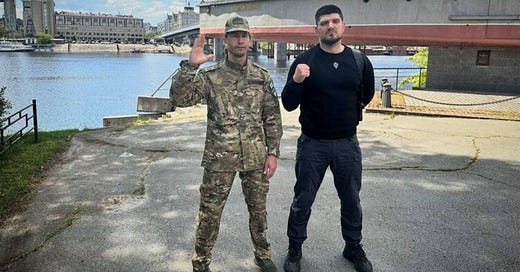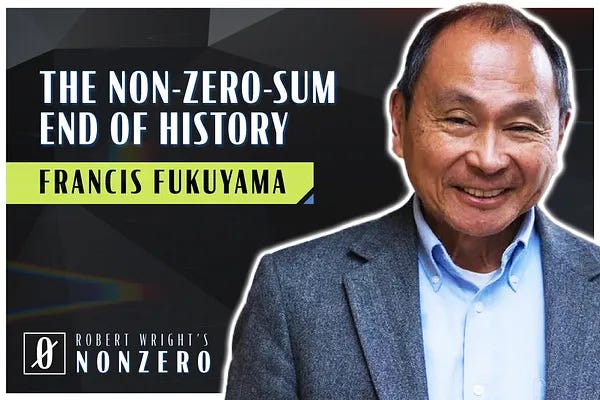Why the chances of nuclear war grew this week
Plus: AI unseats counselors, Elon’s big new rival, NZN’s new Cognitive Empathy Award, climate gets godsend, paid subscriber perks, and more!

This week retired Army General Kevin Ryan, who served as US defense attaché to Moscow, said the chances of Russia using a nuclear weapon in Ukraine are greater than 50 percent. “We should be practicing more for a nuclear battlefield,” he said in an interview with Connor Echols of Responsible Statecraft.
On Monday, three days after the interview was recorded, a drama unfolded along the Russia-Ukraine border that illustrates how wartime developments can raise the chances of such an escalation—or, for that matter, the other kind of dreaded escalation, the kind that would draw NATO into the war without the war going nuclear. These changes in the probability of catastrophe are often small, and this week’s change is no exception. But they add up, and hardly anyone notices until they reach critical mass.
The drama involved dozens of well-armed soldiers who crossed into Russia from Ukraine, killed at least one Russian soldier, and then advanced seven miles before Russian forces killed some of them and pushed the rest back into Ukraine.
The soldiers who conducted the raid were of Russian ethnicity and said they were acting not in coordination with the Ukrainian military but rather in their capacity as Russian revolutionaries who aimed to overthrow Vladimir Putin. Various things rendered this claim of operational autonomy implausible, including the fact that (1) on days when they’re not trying to start a Russian revolution, these soldiers serve under the command of the Ukrainian military (among the “foreign legions,” since they hail from Russia); and (2) the dozen or so armored vehicles they used included models that the US had given to the Ukrainian military and hadn’t given to any self-described Russian revolutionaries.
This episode has at least three properties that, by however small a measure, could raise the chances of future escalation by Putin, including escalation to the nuclear level.
1. The raid could increase the Russian public’s backing for escalation broadly—partly because it makes Russians feel more threatened by Ukraine, but also because Putin can claim it supports the narrative he used to justify war in the first place.
Putin said on the eve of the invasion that the de facto NATOization of Ukraine (via the provision of weapons, training, and other forms of military assistance from NATO members) posed a threat to Russia’s security. This week, for the first time in recorded history, NATO-issue military vehicles entered Russian territory carrying soldiers who then attacked Russians.
Putin also said on the eve of the invasion that military action was needed to cleanse Ukraine of its Nazi elements. Monday’s incursion featured a number of people who fit in with that theme, including Alexey Levkin, who founded an annual Nazi music festival, and Aleksandr Skachkov, who was once arrested for selling translations of the white nationalist manifesto penned by the perpetrator of the 2019 Christchurch massacre. The Russian Volunteer Corps, one of two groups that constituted the raiding party, holds that Russia should have an all-white citizenry and considers Ukraine admirable for its relative ethnic purity. (The group’s leader is pictured above, on the right.)
2. Incursions like this satisfy Putin’s stated criteria for launching a nuclear strike.
Putin said in October that Russia’s national security doctrine permits the use of nuclear weapons to “protect its sovereignty, territorial integrity, and to ensure the safety of the Russian people.” That’s actually a loose rendering of Russian nuclear doctrine, which speaks of a threat “to the very existence of the state.” But Putin’s interpretation of the doctrine is the interpretation that matters.
This interpretation may be part of the reason the Biden administration says that US-supplied equipment shouldn’t be used in attacks on Russian soil. (This week’s events brought no explicit protestations from the Biden team. But there may have been a passive-aggressive reprimand in the administration’s leaking a story to the New York Times implicating Ukraine in a recent drone strike on the Kremlin and conveying concerns that all such incursions, including this week’s, could lead Russia to “blame US officials and retaliate by expanding the war beyond Ukraine.”)
3. Incursions like this could satisfy criteria for a nuclear strike that, though Putin has never articulated them, almost certainly apply.
Though a true existential threat to Russia might well, in keeping with its nuclear doctrine, trigger a nuclear attack, there’s a different kind of existential threat that could also have that effect and is more likely to materialize in the near term: a threat to Putin’s regime. This week’s raiding party didn’t by itself come close to constituting such a threat (its stated ambitions notwithstanding). But if attacks like this create a sense among Russians that the regime isn’t keeping them secure, Putin’s hold on power could gradually weaken.
Another thing that could weaken his hold on power is a big setback in the war. If it starts looking like he has gotten tens of thousands of Russians killed without achieving his stated war aims—or, worse still, is losing Ukrainian territory Russia held before the war—then domestic rivals will be emboldened. Indeed, this week, shortly after the incursion, Yevgeny Prigozhin, head of the Wagner Group, mockingly said Russia’s stated aim of “demilitarizing” Ukraine had backfired and alluded to the possibility of a future revolution.
That Putin considers big battlefield setbacks unacceptable was the premise of General Ryan’s disturbing assessment. He said in that Responsible Statecraft interview:
When Ukraine mounts its counter offensive, if they have significant success in taking back territory that Russia has occupied—for example, large parts of any of the four provinces that Russia has annexed, or Crimea itself—then the Russian military will be expected to escalate their operations to prevent that or to counter that. Putin will demand that. If the Russian military is not able to escalate or to prevent Ukraine from doing those things, Putin will have no other way of escalating the war militarily than through a nuclear weapon.
Most analysts, it should be noted, believe the chances of a nuclear strike are considerably less than 50 percent. But when you’re talking about nuclear war, chances much lower than that are still very disturbing—as is every development that pushes them up by even a little bit.
Attention NZN members!
This week we bring you early access to a conversation with influential author and political scientist Francis Fukuyama that is (tentatively) scheduled for posting in two weeks. The conversation is about how the argument in Fukuyama’s famous book The End of History has or hasn’t held up—and also how the argument in the book Nonzero has or hasn’t held up, and how the two books, both of which see a kind of direction in history, are alike and different.
And, as usual, tonight paid subscribers will have access to the latest edition of the Parrot Room, the few-holds-barred, after-hours conversation between Bob and Mickey Kaus that follows their public podcast.
As “generative” AIs like ChatGPT begin disrupting the economy, what kinds of workers will be threatened by the first wave of automated unemployment?
This week brought an unexpected addition to that list: eating-disorder crisis counselors. The National Eating Disorders Association is letting go of eight employees and hundreds of volunteers who had operated its telephone helpline—and replacing them with “Tessa,” an AI chatbot, NPR reports.
The helpline was flooded with calls and text messages during Covid— nearly 70,000 last year alone—and the numbers still haven’t returned to pre-pandemic levels. In March, staff members, feeling overwhelmed, told NEDA they were preparing to unionize. Four days later, they were informed that the helpline was being shuttered and would transition to Tessa in June.
Tessa is less sophisticated than ChatGPT and, accordingly, less likely to go off the rails; she’s programmed to select from a restricted range of potential replies. And there’s evidence that interacting with her is, if no substitute for a skilled human counselor, more helpful than being put on a waitlist. But critics of NEDA’s move say Tessa could alienate people reaching out for human contact during a mental health emergency.
Cognitive empathy—trying to see things from the perspective of other people, if only for the sake of understanding and anticipating their actions—isn’t exactly a strong suit of US foreign policy makers, a fact this newsletter has been known to lament. And others who influence foreign policy thinking, including many journalists and think tankers, also show signs of cognitive empathy deficit.
So, in hopes of incentivizing cognitive empathy on the part of these elites, NZN has decided to periodically issue a Cognitive Empathy Award—and, importantly, to deem it “prestigious,” “coveted,” “cherished,” and (if those three adjectives don’t do the trick) “lusted after.”
Our inaugural honorees are David Pierson and Chris Buckley of the New York Times. In a piece published shortly after the recent G7 Summit, Pierson and Buckley conveyed a sense for how the summit, and dynamics among western nations more generally, look to leaders in Russia and China.
In particular, they did something all too rare when reporting about adversaries: observe that these adversaries are motivated not just by aspirations to dominate America or the West but also by fears of dominance by America or the West. You can see that even in the headline:
Some highlights from the piece itself:








